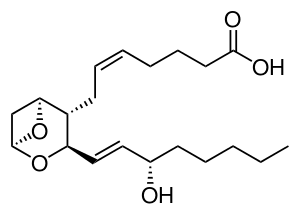Ghosal hematodiaphyseal dysplasia
Ghosal hematodiaphyseal dysplasia is a metabolic disorder.
| Ghosal hematodiaphyseal dysplasia | |
|---|---|
| Other names | GHDD[1] |
 | |
| Thromboxane A2 | |
It is associated with diaphyseal dysplasia and refractory anemia.[2]
It is associated with a deficiency of Thromboxane-A synthase,[3] which produces Thromboxane A2.
It was characterized in 1988.[4]
References
- "OMIM Entry - # 231095 - GHOSAL HEMATODIAPHYSEAL DYSPLASIA; GHDD". omim.org. Retrieved 14 April 2019.
- Isidor B, Dagoneau N, Huber C, et al. (April 2007). "A gene responsible for Ghosal hemato-diaphyseal dysplasia maps to chromosome 7q33-34". Hum. Genet. 121 (2): 269–73. doi:10.1007/s00439-006-0311-1. PMID 17203301.
- Geneviève D, Proulle V, Isidor B, et al. (March 2008). "Thromboxane synthase mutations in an increased bone density disorder (Ghosal syndrome)". Nat. Genet. 40 (3): 284–6. doi:10.1038/ng.2007.66. PMID 18264100.
- Ghosal SP, Mukherjee AK, Mukherjee D, Ghosh AK (July 1988). "Diaphyseal dysplasia associated with anemia". J. Pediatr. 113 (1 Pt 1): 49–57. doi:10.1016/S0022-3476(88)80527-4. PMID 3385529.
This article is issued from
Wikipedia.
The text is licensed under Creative
Commons - Attribution - Sharealike.
Additional terms may apply for the media files.